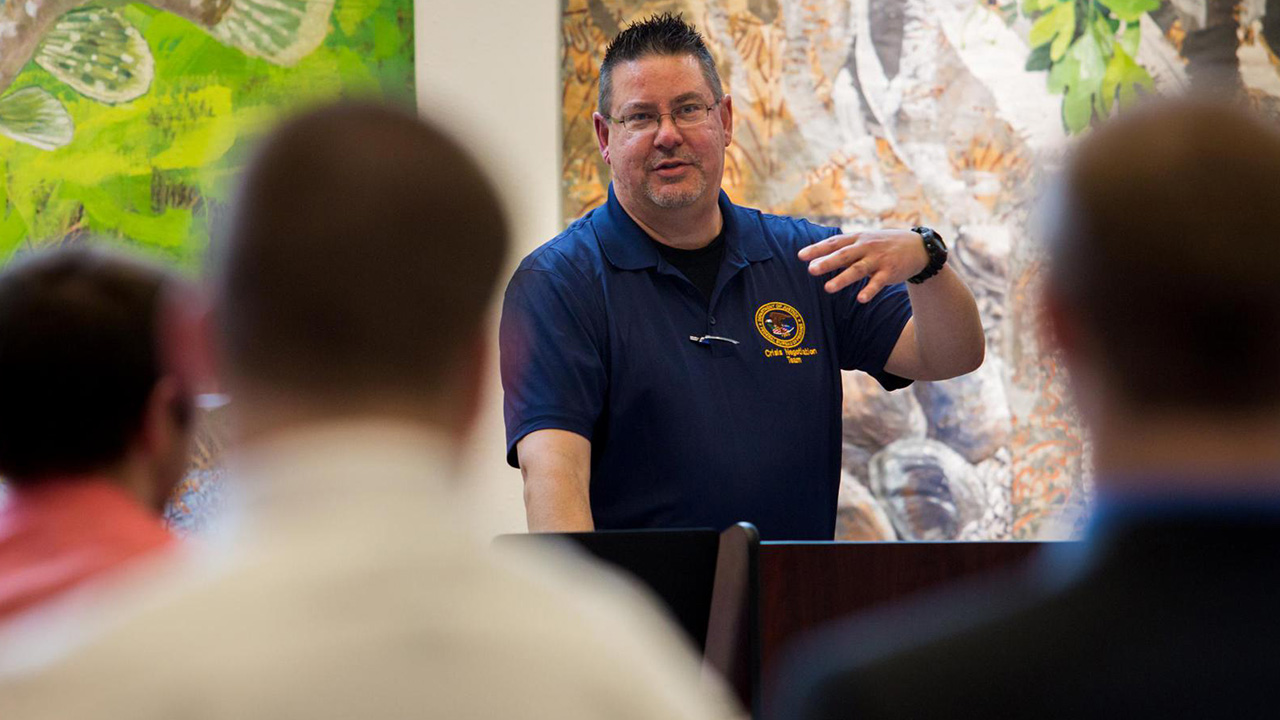
Two-time University of Wisconsin-Platteville graduate and Criminal Justice Instructor Chris Polzer was named one of the university’s 2020 Distinguished Alumni. Recipients of the honor, which is presented by the Alumni Association, are chosen for their contributions to and recognition in their professions and communities, and continued engagement with the university.
Polzer earned his bachelor’s degree in criminal justice in 1988 and his master’s degree in guidance and counseling in 1992. After more than 25 years with the Federal Bureau of Prisons—working in roles including Equal Employment Opportunity counselor, drug treatment specialist, certified hostage negotiator, and diversity management instructor—he retired and now teaches criminal justice online and in-person for UW-Platteville.
In addition to teaching, Polzer served on the Alumni Association’s Alumni Board of Directors for several years, guest lectured on campus, and participated in the Criminal Justice Career Day, including serving as a keynote speaker. In 2012, he received the Pioneer in Criminal Justice Award and in 2019, the LAE Professional Development Award. Polzer was also selected as the 2020 UW-Platteville College of Liberal Arts and Education commencement speaker. Outside of teaching, Polzer serves on several community and professional boards and is a student mentor.
What are you up to now?
In December of 2016, I retired after 25-plus years with the federal Bureau of Prisons. I am currently on four different boards—Columbia County Board of Supervisors, Village of Poynette Board of Trustees, Madison College Board of Directors, and I am the Chairman of Columbia County Crime Stoppers.
I teach various classes depending on the term; I am currently teaching Juvenile Justice online at UW-Platteville. I was also in the classroom at UW-Platteville last spring, but we all know what happened there! I hope to continue and expand my teaching career moving forward.
You received both your undergraduate and graduate degree at UW-Platteville. Why did this university appeal to you?
I was asked to leave UW-Madison after three semesters due to some “misunderstandings.” The Criminal Justice program at UW-Platteville was well recognized, and I was interested in a career in law enforcement. I visited Platteville in the summer and met with an individual by the name of Joe Lomax—he remains a mentor to me to this day. I attended graduate school due to the opportunity I received from the Student Housing Department and became a Resident Director. I am forever grateful to Rich Egley for the opportunity. My ultimate goal was federal law enforcement—which I am pleased to say worked out.
Why did you want to start teaching at UW-Platteville?
I began by being a guest speaker in the CJ Department—Mr. Lomax and Dr.’s Cheryl Fuller and Amy Nemmetz provided me those opportunities. I believe I may have initially missed my calling (and passion)—if I had it to do over again, I would have become a history professor! Note: I recently spoke to Dr. Nemmetz’s Foundations of Corrections class—very refreshing and reminded me how much I miss being in the classroom. Again, I enjoy spending time on the UW-Platteville campus, including interacting with students and attending alumni events.
Can you tell me about your time on the Alumni Association’s Alumni Board of Directors?
Being on the Alumni Board of Directors was one of the smartest things I’ve done. I love being on the UW-Platteville campus and enjoy giving back as well. This includes visiting campus as often as possible, and Homecoming is always a highlight for me as well as my wife and family. I made lifelong friends (including Dan Smith, Sue Lindholm, and Dave Smutzler), and enjoyed my involvement with the Board of Directors immensely. Unfortunately, due to my employment with UW-Platteville and the change in the UW System Regent by-laws, I was no longer allowed to do both.
Why is maintaining a connection to UW-Platteville as an alumnus important to you?
I am so passionate about maintaining a connection to UW-Platteville for several reasons, and this includes “giving back.” This university gave me a second chance, provided me with an excellent academic and social atmosphere, and always stood behind me. In addition, I value volunteerism—including giving back by being a guest speaker in various classes. Giving back, in my opinion, doesn’t just mean financially—we have incredible alumni from all disciplines of study—I see them as one of our most valuable resources. That said, I also value all of our students—another reason I enjoy teaching so much, as well as being on campus. My passion for teaching also plays a role in this.
What does it mean to win the 2020 Distinguished Alumni Award?
I view this as a complicated question—the nomination process is incredible and with many moving parts. I was notified on a Friday afternoon by Aaron Athas, Alumni Association Board President. Quite frankly, I am still somewhat in shock, but I doubt I will ever forget receiving the phone call. The exact meaning hasn’t quite hit me yet. From a personal perspective, at various times I would never have thought it possible.
How do you like to spend your time outside of work?
Being retired does provide me with much more flexibility. Along with the board activities already mentioned, I volunteer once a week with a student I mentor in a Madison school. Prior to COVID-19, this was one of my most rewarding experiences. I have recently begun doing more writing, and I also consider myself a cigar aficionado. The organizations (boards) I mentioned above keep me quite busy.
Is there anything else you’d like to add?
I am extremely honored and humbled to have been selected as a Distinguished Alumni. I have a great deal of gratitude for the many people who have assisted me along the way, but I haven’t been able to mention them all here. I would like to add my wife, Pamela, to that group; I could not have accomplished any of my successes without her support.